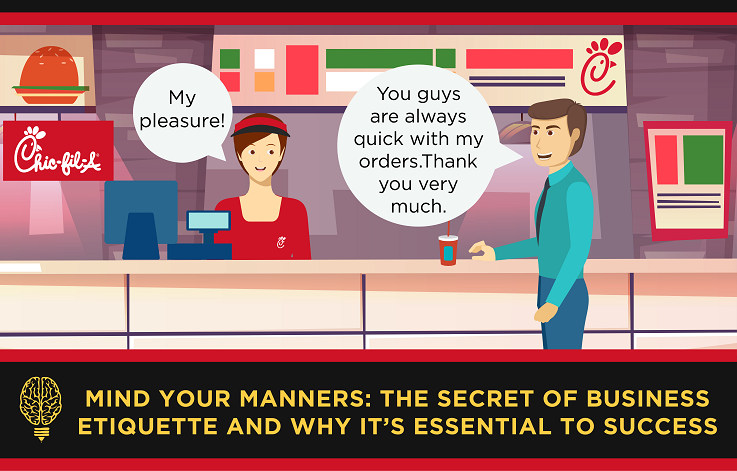Mind Your Manners: The Secret of Business Etiquette and Why It Matters
Chick-Fil-A was rated the best fast food customer service restaurant according to the 2019 America’s Best Customer Service Survey.
By Andrew Amaechi Original: 11/18/2019
Before you consider “Starting a Business” it is important that we discuss business etiquette to help you understand just how much of a role mannerism play in business and professional success.
Corporate Culture Then vs Now
Corporate culture in America has undergone a shift from its traditional beginnings to a more relaxed environment. Over the last decade, we have traded in the suit & tie for the casual t-shirt and jeans. Sometimes, employees even wear pajamas (for those who are part of #TeamTelework). And while this has done wonders to morale and productivity, it has crippled the foundation of manners and etiquette especially within the millennial demographic.
The Internet age has played a huge role in revolutionizing a workplace leading to two types of work environments – informal and formal. To make the workplace relaxing, companies like Google, Facebook, Amazon and Zappos among others have adopted the informal workplace which allows employees to wear anything to work (so long as they are not sexually suggestive or offensive) and also bring their pets as well.
Other companies like Bank of America and Morgan Stanley make use of the formal workplace with stricter policies regarding dressing (traditional suit & tie) and overall conduct at the workplace.
During my 9-year consulting career, I have worked with the executives of several prominent Fortune 100 and Fortune 500 companies and in all that time, I discovered a lot about the importance of etiquette in business. Some of my lessons took place on the job while others were because of my many intimate conversations with the leaders of those respective companies.
Regardless of the method of acquisition, the takeaway was always the same – success in the business/professional world requires a polished form of manners and etiquette.
Below are 11 personal takeaways which I have gathered over the years:
Research suggests that millennials have become less worried about pleasantries, manners and etiquette even as simple as a “bless you” or turning off your phone during a meal.
Millennials engage less in etiquette than any other demographic.
Using Mr., Ms., Sir, no matter how well you know the person depicts respect and that you are there to serve them.
Use yes/no sir and yes/no mam when responding to questions or inquiries.
“My pleasure” shows a different level of willingness to assist the customer... AVOID USING THE PHRASE "NO PROBLEM"...Because it insinuates that serving the customer or client presented you with an issue/problem.
“Thank you for your time”: if somebody makes time to do something for you (always start your appreciation by saying: "I want to thank you for your time" ... it shows you value their time and displays an attitude of gratitude.
Avoid interrupting people: Interrupting someone is a sign of disrespect which will only hinder your relationship with the other party. Always listen first, then respond afterward.
Acknowledge the person you are speaking to (even if you disagree) by using non-verbal gestures such as a head nod, facial gestures and eye contact. Saying "hey I completely understand your point of view, however, consider this approach” or “this may be a better solution”" to someone you disagree with can actually move your conversation forward.
·Be present throughout the conversation: Avoid distractions such as texting and phone calls.
Hold the door open: This applies not only to men but women as well. It’s a very simple but often overlooked gesture of courtesy.
Be proactive when asked a question even if you are unsure about the answer:
- “Sir/mam, that's a great question. I'd be more than happy to get you the answer...or…I'd be happy to find that answer for you sir/mam” (Saying I don’t know or I’m not sure is UNPROFESSIONAL).
Conclusion
As the saying goes “the little things make all the difference”. This applies even to the professional/business world. Taking a proactive approach to your manners can go a long way in building fruitful and lasting relationships with your leaders, fellow colleagues, and especially your clients. These separate those who remain successful in business from those that struggle. So, what is your current approach to manners and business etiquette? Do you think the lack of either has hindered you in your place of work or your business? What lessons could you apply to your daily work and/or business etiquette based on the information above? Sound off below.
At Generation Mastermind, we seek to inspire you and help you grow in your career, life, and business. If you like this post, share it on Facebook, Twitter, LinkedIn, and other social media platforms. And don’t forget to add your comments below to tell me what you think.
“Creatively educating, inspiring and connecting with today’s dreamers and tomorrow’s leaders.”
-Andrew3000


